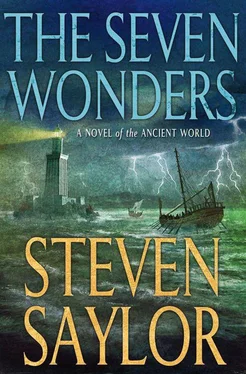Steven Saylor - The Seven Wonders
Здесь есть возможность читать онлайн «Steven Saylor - The Seven Wonders» весь текст электронной книги совершенно бесплатно (целиком полную версию без сокращений). В некоторых случаях можно слушать аудио, скачать через торрент в формате fb2 и присутствует краткое содержание. Год выпуска: 2012, Издательство: Macmillan, Жанр: Исторический детектив, на английском языке. Описание произведения, (предисловие) а так же отзывы посетителей доступны на портале библиотеки ЛибКат.
- Название:The Seven Wonders
- Автор:
- Издательство:Macmillan
- Жанр:
- Год:2012
- ISBN:нет данных
- Рейтинг книги:4 / 5. Голосов: 1
-
Избранное:Добавить в избранное
- Отзывы:
-
Ваша оценка:
- 80
- 1
- 2
- 3
- 4
- 5
The Seven Wonders: краткое содержание, описание и аннотация
Предлагаем к чтению аннотацию, описание, краткое содержание или предисловие (зависит от того, что написал сам автор книги «The Seven Wonders»). Если вы не нашли необходимую информацию о книге — напишите в комментариях, мы постараемся отыскать её.
The Seven Wonders — читать онлайн бесплатно полную книгу (весь текст) целиком
Ниже представлен текст книги, разбитый по страницам. Система сохранения места последней прочитанной страницы, позволяет с удобством читать онлайн бесплатно книгу «The Seven Wonders», без необходимости каждый раз заново искать на чём Вы остановились. Поставьте закладку, и сможете в любой момент перейти на страницу, на которой закончили чтение.
Интервал:
Закладка:
The men around Tullius nodded thoughtfully and grunted in agreement.
“What utter nonsense!” muttered Antipater.
“Of course,” Tullius went on, “when any city meets it end, there are deeper causes at work. Some contend that divine will engineered the destruction of Corinth, but others argue that her own reckless leadership was quite capable of causing the city’s downfall without any intervention from the gods. That the Corinthians had grown corrupt and decadent, no one can deny. There is a theory that proximity to the sea, while it may bring commerce and riches to a city, may also bring the vices of luxury and exotic temptations. Men are distracted from the virtues of discipline and bravery and spurred to compete instead in extravagant shows of wealth. The same decay afflicted Carthage, another maritime city, where the love of commerce and foreign goods made the people soft. Corinth was perhaps doubly at risk in this regard, having not one but two ports on either side of the isthmus, only a few miles apart.” He nodded thoughtfully. “I am reminded of another of Antipater of Sidon’s laments for Corinth, which alludes to the city’s special relationship with the sea. In that poem, the beautiful Nereids, daughters of Ocean, bemoan the city’s fate.”
Tullius paused and cleared his throat. “I shall quote the poem now-that is, if Zoticus here does not object?” He smiled, but this rhetorical flourish was strictly for the amusement of his listeners; he did not even glance in Antipater’s direction. “Well, then-
“Where, O Corinth, is your fabled beauty now?
Where the battlements and ramparts-”
“Oh, really, this is too much to bear!” said Antipater, who turned about and stalked off. I followed him. The laughter and the quips of the Romans (“Silly old Greek!”) rang in my ears.
“Teacher!” I cried, but rather than halting, Antipater quickened his stride. The way became steeper and steeper as we began to ascend toward Acrocorinth, and still he hurried on. We appeared to be following the course of what had once been a well-maintained road that skirted the steep face of the mountain and circled around to its far side before reaching the top. The road became little more than a poorly kept footpath, switching back and forth as it wound its way up the slope. I began to think Antipater would reach the top without stopping, but eventually he paused for breath. Whether from exertion or anger at the Romans, his face was bright red.
“Do you know the tale of Sisyphus?” he asked me.
“The name is familiar.…”
He shook his head, dismayed yet again at my ignorance.
“Sisyphus was the founder of Corinth, the city’s first king. Somehow he offended Zeus-the tales vary-and he was given a terrible punishment, forced to roll a boulder up a steep hill only to see it slip away and roll back down again, so that he had to repeat the pointless task over and over again. Some believe this was the very hill where Sisyphus carried out the impossible labor Zeus set for him. That is why this is called the Slope of Sisyphus.”
I looked down the rocky incline, then looked upward. We were more than halfway to the top, but the steepest part was yet to come. Antipater resumed the ascent.
We passed the ruined walls of what must have been a fortress, and at length we arrived at the summit and stood atop the sheer cliff that towered above the remains of Corinth. To the north lay the sea. The wharves at Lechaeum were tiny in the distance, with tiny Roman galleys moored alongside them; the walls of the waterfront garrison were manned by Roman soldiers almost too small to be seen. Below us, at the foot of the cliff, I could clearly discern the course of the old walls and the layout of Corinth.
The sun was directly overhead. The harsh light and the lack of shadows made everything look stark and slightly unreal, drained of color and parched by the warm, dry wind. From the ruins below I imagined I could hear a sound like many voices whispering and moaning. The ruins themselves appeared to shimmer, an illusion caused by the rising heat and the undulation of high grass amid the stones. I shivered, and felt dizzy from the heat.
“What really happened here, Antipater?”
He sighed. “According to our friend Tullius, the Corinthians brought about their own destruction. Typical Roman reasoning: blame the victims!
“When the Corinthians and their allies in the Achaean League revolted, they lashed out against the Spartans, who remained loyal to Rome. The Romans used that incident as a pretext to mount a full-scale invasion of the Peloponnesus-they claimed they were merely coming to the defense of an ally. There were several battles. The Achaean League was crushed, and its leaders were either killed or committed suicide. The climax occurred here, at Corinth. The city opened its gates in surrender, but Lucius Mummius had been given orders by the Senate to make an example of Corinth. His soldiers poured into the city and utterly destroyed it.
“Men were rounded up and slaughtered. Women were raped; if they survived, they were sold into slavery. The same thing was done to the children. Houses and temples were looted, then burned. The soldiers were allowed to stuff their pockets with all the jewelry and gold they could carry, but the choicest works of art were claimed by Mummius and sent back to the Senate. Rome was enriched beyond measure. Look inside any temple in Rome; all the best paintings and statues came from Corinth. And half of them are mislabeled, because the ignorant Mummius couldn’t tell a statue of Zeus from one of Poseidon!”
Antipater paused for a long moment, lost in thought. “There’s a painting by an artist named Aristeides, a stunning work. Hercules is in agony, trying to rip off the poisoned shirt given him by his wife, who thought the magical garment would merely make him faithful to her. Deianira is in the background, horrified by what she’s done. The scheming centaur Nessus looks on from his hiding place in the woods, laughing. When I was a boy, my father took me to see that painting here in Corinth. How that image fascinated and terrified me! I never forgot it. Then, a few years ago, I had occasion to enter a temple in Rome, and there in the vestibule, I saw it again-not a copy or imitation, but the very painting by Aristeides! That was when my boyhood memories of Corinth came flooding back. That was when I wrote this poem.”
Antipater stepped to the very edge of the precipice. I held my breath, fearful that a gust of wind might push him over, but I didn’t dare interrupt him. The words that had sounded pompous and hollow coming from Tullius sounded very different as they poured from Antipater.
“Where, O Corinth, is your fabled beauty now?
Where the battlements and ramparts, temples and towers?
Where the multitudes that lived within your walls?
Where the matrons holding vigil in your sacred bowers?
City of Sisyphus, not a trace is left of you.
War seizes and devours, takes some and then takes more.
Ocean’s daughters alone remain to mourn for you.
The salt tears of the Nereids lash the lonely shore.”
I stepped beside Antipater. Together we gazed down at vanished Corinth with the moaning of the wind in our ears.
A movement amid the ruins caught my eye. It was the party of Tullius-or so I presumed. The tiny figures were too distant to be clearly discerned, but among them I thought I recognized Tullius by his red hair and bristling beard. They were no longer standing in a group, listening to Tullius, or following him from place to place. They seemed to be poking amid the rubble and moving bits of it about, but toward what purpose I couldn’t imagine. I thought of asking Antipater’s opinion, but his gaze was elsewhere, and I didn’t wish to agitate him by returning his attention to Tullius.
Читать дальшеИнтервал:
Закладка:
Похожие книги на «The Seven Wonders»
Представляем Вашему вниманию похожие книги на «The Seven Wonders» списком для выбора. Мы отобрали схожую по названию и смыслу литературу в надежде предоставить читателям больше вариантов отыскать новые, интересные, ещё непрочитанные произведения.
Обсуждение, отзывы о книге «The Seven Wonders» и просто собственные мнения читателей. Оставьте ваши комментарии, напишите, что Вы думаете о произведении, его смысле или главных героях. Укажите что конкретно понравилось, а что нет, и почему Вы так считаете.










